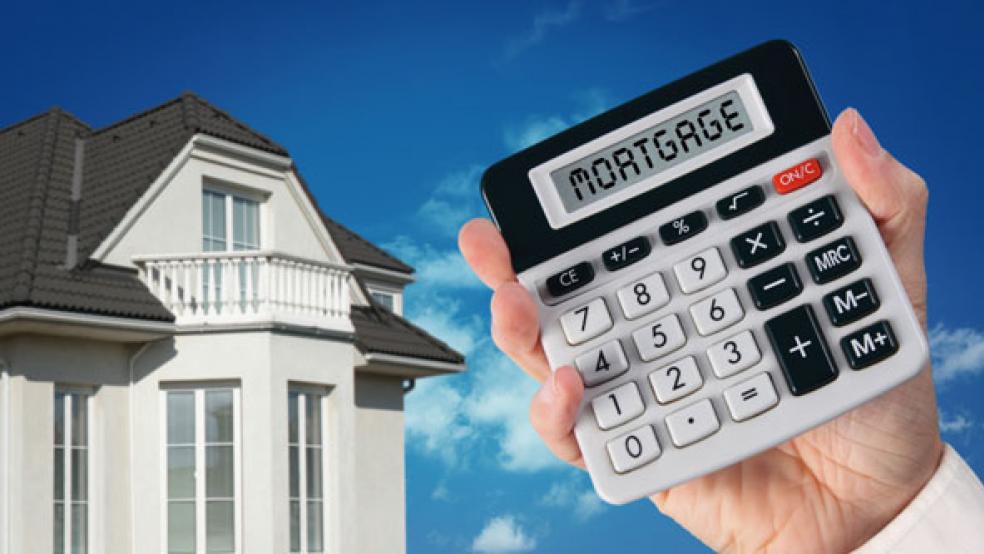It's a common belief in real estate that house prices are correlated to interest rates. The idea, beloved by homebuyers, is that if mortgage rates rise, prices of homes for sale must fall because otherwise those homes will become less affordable.
The problem with this belief is that, well, it's not true. In fact, there's no strong relationship between house prices and interest rates, according to Mark Palim, vice president for applied economic and housing research for Fannie Mae.
"Rates tend to rise because, in a relative sense, the economy is doing well, incomes are going up, people can afford more and they're willing to take out a larger mortgage. Intuitively, you'd think that if interest rates go up, of course, house prices go down. But they don't," Palim says.
"The bottom line is that other factors (like a stronger economy) have a bigger impact on house prices than changes in mortgage rates," blogger Bill McBride writes in a post on his financial blog, CalculatedRisk.com.
Still, the interplay of rates and prices encompasses a lot of factors, so some clarifications and caveats should be made clear.
Related: What Rising Rates Will Cost You in 2014
In the past few years, inflation-adjusted house prices tended to move in the same direction of mortgage rates, not the opposite direction.
Mortgage rates indirectly affect home sales
While interest rates don't have an obvious direct correlation with prices, long-term rate fluctuations can affect the volume of home sales, according to data tracked by the National Association of Realtors.
"Higher interest rates can negatively impact home sales, but prices move according to the relative supply and demand and have generally increased in declining sales markets," explains Realtors spokesman Walter Molony.
A sudden and unexpected rise in rates can not only cause slippage in home sales, but also trigger readjustment by current buyers, who might opt to make a larger down payment, buy a less expensive home, select an adjustable-rate mortgage with a lower starter interest rate or exit the housing market in hopes of lower rates in the future.
"You do see a market impact, but it's not just directly on prices," Palim says.
Related: Real Estate in 2014 - A Need-To-Know Guide
Higher rates and affordability
When rising rates force entry-level buyers to the sidelines, repeat buyers are affected as well, and that effect can spread through the housing market, says Greg Cook, a loan consultant at Platinum Home Mortgage in Temecula, Calif.
"If first-time buyers are getting priced out (due to rising rates), that's going to work its way up the chain. People who already own a home they want to sell aren't going to be able to sell, so it's going to progress up the ladder. Eventually that will hurt prices," Cook says. "The hard part is to draw the correlation in this market because interest rates aren't a deal-breaker. If rates go to 7 percent, then they become the deal-breaker."
Rates also affect the tipping point at which renting or buying is more affordable for those who aren't already owners. In some cities, buying is a no-brainer unless rates rise stratospherically far above normal market levels. In other cities, rates as low as the 5 percent range could make renting more attractive than buying, reducing demand for homeownership in those areas.
Investors focus on returns
Real estate investors might seem unconcerned about interest rates because they tend to pay cash. However, as Palim explains, investors do have one eye on alternative investments that can become more or less attractive relative to real estate as rates fluctuate.
"Even though they don't need a mortgage, they might say, 'My expected rate of return on rental property isn't as good as it was a year ago, and I could be making another investment that looks better,'" Palim says. "I don't think we're at that point now, but looking out a year, we could be."
McBride also makes this point, writing in his blog that investors "will compare their returns on different investments -- and rising rates will probably slow investor demand for real estate, even if they are all-cash buyers."
Unpredictability breeds caution
Finally, the current housing market features a couple of wild cards that aren't present in the historical data showing that prices aren't correlated to rates.
One wild card is the Federal Reserve's massive multiyear bond-buying program known as quantitative easing, or QE. Another is the double-digit spurt in house prices that occurred in 2013. Together or separately, those factors should inject a "little bit of caution," to use Palim's words, into analyses and expectations of how prices and rates might behave in the future.




